#why is it one of the rare times mcr is in a form of media
Text
how much money do you guys think mcr made off of destroya being in that one episode of teen wolf?
#i wonder if they still get tiny checks with residuals#or if it was a lump sum#like how did that work out#why is it one of the rare times mcr is in a form of media#teen wolf#overly specific mcr memes#my chemical romance#mcr
196 notes
·
View notes
Text
Favourite music of the decade!
This is some of what I’d consider the most innovative, artistic and just great to listen to music from 2010-2019.
First a Lot of very good songs:
Crying - Premonitory dream
Arcade Fire - Normal person
Sufjan Stevens - I want to be well
Deerhunter - Sailing
Foster the People - Pumped up kicks
Carly Rae Jepsen - Boy problems
Grimes - Butterfly
Travis Scott - Butterfly effect
Future - March madness
Kanye West ft. Nicki Minaj et al - Monster
Juice Wrld - Won’t let go
Danny Brown - Downward spiral
Kendrick Lamar - Sing about me, I’m dying of thirst
Kate Tempest - Marshall Law
The Avalanches - Stepkids
Iglooghost - Bug thief
Vektroid - Yr heart
Ariel Pink - Little wig
Mac Demarco - Sherrill
Vektor - Charging the void
Jyocho - 太陽と暮らしてきた [family]
Panic! at the disco - Ready to go
The Wonder Years - An American religion
Oso oso - Wake up next to god
The World Is a Beautiful Place & I Am No Longer Afraid to Die - I can be afraid of anything
And my top 20(+2) albums:

Calling Rich gang’s style influential on trap would be like saying Nirvana may have had some impact on early-90s grunge. In 2019 with trap so omnipresent in popular music, hip hop or otherwise, through the impact of artists like Drake and Travis Scott it’s almost hard to remember when this was a niche genre - it was Rich gang that popularised its modern sound here. Birdman’s beats with their rattling hi-hats and deep bass could have been made 5 years later without arousing suspicion, while Rich Homie Quan and Young Thug deliver consistently entertaining flows and numerous bangers between them. Thugger, this being his first major project, steals the show with his yelpy and hilarious rapping style. This may have once been the defining sound of house parties in the Atlanta projects; now it can be heard blasting in the night from white people’s sound systems around the world.
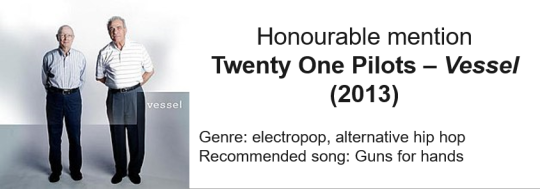
Early 21p may have never aimed to be cool, to avoid a certain appearance of lameness, but they did have a knack for writing some really catchy pop with an optimistic message. To the devoted, the critics of Pilots’ apparent mishmash of nerdy rap, sentimental piano balladry and EDM production were just stuffy, wanting music to stay how it was back-in-the-day forever and unwilling to get with the times. This viewpoint is understandable when you approach this album openly and actually listen to Tyler Joseph’s lyrics about youthful anxiety and insecurity, delivered with real conviction and sincerity, actually recognise that disparate musical elements are all there for emotional punch. A few songs do underwhelm. But this is emo for post-emo Gen Z’s and it’s easy to see why to some it can be deeply affecting.

The musical ancestor to the ongoing and endless stream of ‘lo-fi hip hop beats’ youtube mixes, chillwave filled the same low-stress niche, and Dive released at the peak of the genre’s relevance. Tycho’s woozy, mellow sound prominently features rich acoustic and bass guitar melodies over warm synths, enhancing the music’s organic feel compared to that of purely digital producers in the genre. The experience of starting this album is like waking up in a soft bed, the cover’s gorgeous sunrise reddening the room’s walls, while a guitarist improvises somewhere on the Mediterranean streets outside. And it is indeed great to study or relax to!

Simple, minimal acoustic guitar and vocals. If you’ve got talent this type of music shows it, or else it doesn’t: perfect then for Ichiko Aoba. Her touch is light, her songs calm, meditative, in no rush to get anywhere. As if serenely watching a natural landscape, one can best understand and enjoy Aoba’s music in quiet and peaceful appreciation.
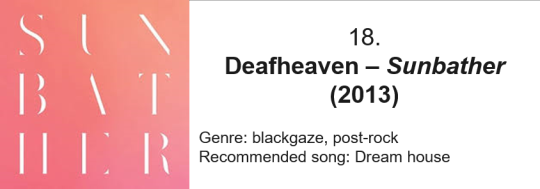
Through the incorporation of genres like shoegaze and alternative rock, Deafheaven managed to create a rare thing: a metal album that’s both heavy and accessible, needing no sacrifice of one for the other’s sake. Over these four main songs, there’s a sensation of being taken on an intense, atmospheric and even emotional journey, with the band stepping away from the negativity and misanthropy that dominates most metal. The vocals, closer to the confessionalism of screamo than classic black metal shrieks, express more sadness than they do aggression, and in respites between solid blaring walls of guitar and drums, calm pianos and gently strummed guitar passages set a pensive tone. This totally enveloping, flawlessly produced sound can take you away, like My Bloody Valentine’s best work, into a dream or trance.

By the late 2000s MCR had taken their thrones as the kings of a subculture formed from the coalition of goth, emo, scene and other assorted Hot Topic-donned kids, and earned a lifelong place in the hearts of many a depressed teenager. But after the generation-defining The Black Parade Gerard Way took off the white facepaint and skeleton costume, ditched the lyrics about corpse brides and vampires, and embraced an anthemic, purely pop punk sound. The silly story of Danger Days, set in a dystopian California where villainous corporations rule and only the Punks can stop them, serves as a kind of idealised setting for the all-out rebellion against authority and normality that so many fantasised about taking part in. The band’s electrifying performances are the most uplifting of their decade making music. For many diehards the upbeat sound here was a celebration that they’d made it through the most difficult years of their lives, and a spit in the face of those who’d done them wrong.
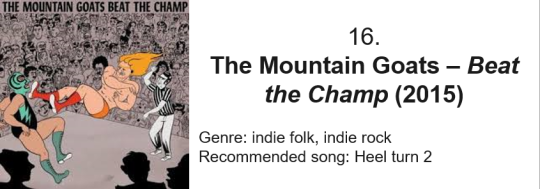
The teller of rural American tales, the indie legend, the teen-whisperer himself. John Darnielle, long past his early lo-fidelity home recordings and now backed by a full band, loses none of the heart his songs are famous for. The theme of the album, taken straight from John’s childhood when the pro wrestling on TV offered an escape from his abusive stepfather, is complemented by the country and Tex-Mex flavouring to the instrumentation. Some of the best lyrics in his long career infuse the stories of wrestlers with universal meaning - his characters try, fail, lose hope, reckon with their mediocrity, and when they step into the ring they’re up against all the adversity life can throw at them. John Darnielle’s saying that when that happens, you stand up and sock back.
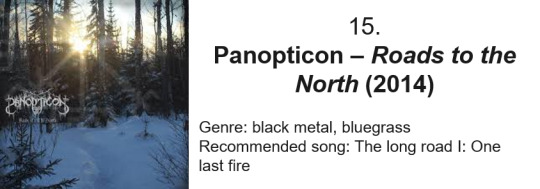
Folk music was always a major part of the Scandinavian black metal scene during its peak years, so when American musicians began exploring the genre naturally they incorporated American styles of folk. The complex, oppressive and sometimes hellish compositions here, starkly contrasted with bluegrass that sounds straight from the campfire circle, give the impression of life in the uncharted woods of the American frontier, in the middle of a brutally cold winter. Almost unbelievably, one-man-band Austin Lunn plays every instrument on the album: multiple guitar parts, bass and drums as well as banjo, fiddle, and woodwinds.
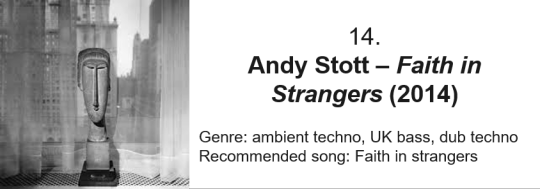
Andy Stott seems to delight in making his music as unnerving, haunting, perhaps even scary, as possible. The female vocals these songs are built around become ghostly, echoing and overlapping themselves disorientingly. The percussion, audibly resembling metal clanging, rustling or rattling in the distance, is often left to stand for its own, creating a tense space it feels like something should be filling. UK-based club and dub music can be felt influencing the grimy almost-but-not-quite danceable rhythms here, but the lo-fi recording and menacing vibe makes this feel like a rave at some sort of dimly lit abandoned factory.
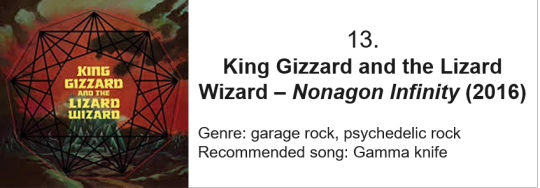
There’s so much Mad Max in this album you can just picture it being set to images of freights burning across the desert. True to its title, the nine songs on Nonagon Infinity roll into each other as if part of one big perpetual composition, with the end looping back seamlessly to the start and musical motifs cropping up both before and after the song they form the base of. With its fuzzy, raw sound, bluesy harmonica and wild whooping, the Gizz create a truly rollicking rock’n’roll experience. The band would go on to release 5 albums within twelve months a year later, but Nonagon shows these seven Australian madmen at the height of their powers.
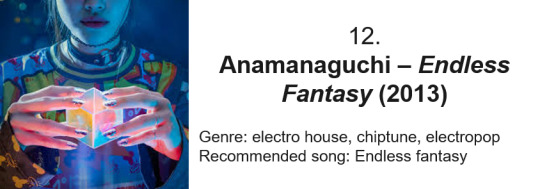
Sometimes you just want to listen to fun, hyperactive pop. The spirit of 8-bit video game soundtracks and snappy pop punk come together to create a vividly digital world of sound that seems to celebrate the worldliness, connectivity and shiny neon colours of early 2010s internet culture and social media. The up-pitched vocals and general auditory mania recall firmly Online musical trends like nightcore and vocaloid, while the beats pulse away, compelling you to dance like this is a house party and the best playlist ever assembled is on. It demands to be listened to at night with headphones, in a room lit only by your laptop screen.
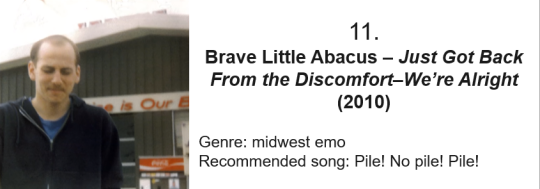
“You hate everyone. To you everyone’s either a moron, or a creep or a poser. Why do you suddenly care about their opinion of you?”
“Because I’m shallow, okay?! … I want them to like me.”
The fact that that Malcolm In The Middle quote is sampled at the emotional climax of this record should give some idea to the absurdity that defines Brave Little Abacus. It’s not even the only sample from the show on here. And yet the passion and urgency so evident in Adam Demirjian’s lispy singing and the band’s nostalgia-inducing, even cozy, melodies are made to stir feelings. The tearjerker chords and guitar progressions are so distinctive of emo bands with that special US-midwest melancholia, and they are interspersed with warm ambiance and playful sound effects ripped from TV and video games, seemingly vintage throwbacks to a sunny childhood. Demirjian’s lyrics, yelled out as if through tears or in the middle of a panic attack, verge on word salad in their abstraction, but that’s not the point: you can feel his small town loneliness and sense the trips he’s spent lost on memory lane. The combined effect all adds to Just Got Back’s themes of adolescence and the trauma of leaving it. While legendary in certain internet communities for this album and their 2009 masterpiece Masked Dancers, the band remains obscure to wider audiences.

These Danish punks know how to convey emotion through their raw and dramatic songs. Elias Rønnenfelt’s vocal presence and charisma cannot be ignored: his husky voice drawls, at times breaks, gasps for breath, builds up the deeply impassioned, intense force behind his words. The band sounds free and wild, unrestrained by a tight adherence to tempo, often speeding up, slowing down or straying from the vocals within the same song, as if playing live. Instrumentally the command over loud and quiet, tension and release, accentuates the vocals in crafting the album’s pace. Horns and saloon pianos throughout give the feel of a performance in a smoky, underground blues bar, with Rønnenfelt swaying onstage as he howls the romantic, distraught, heartbroken lyrics he truly believes in.
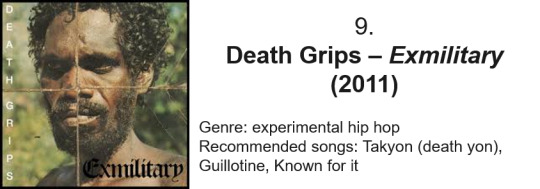
At some point on first listening to Death Grips, a thought along the lines of “He really yells like this the whole way through, huh?” probably crosses the mind. When Exmilitary first appeared, quietly uploaded to the internet, the rapper’s name and identity unknown, another likely reaction among listeners might have been “What am I even listening to?” But perhaps more revolutionary than Death Grips’ incredibly aggressive sound and style might have been its foreshadowing of how over the next decade underground rap acts would explode into the mainstream through viral songs, online word of mouth and memes. It showed all you needed to come from nowhere to the top of the game was to seize attention, and it did that and far more. MC Ride’s intoxicatingly crass, intense rapping captures the energy of a mosh pit where injuries happen, the barrage of sensations of a coke high, while the eclectic mix of rock and glitchy electronics on the instrumentals is disorienting in the best way. If rap were rock and this was 1977, Death Grips would have just invented punk. Ride’s lyrics paint a confrontational, hyper-macho persona; unlike much hip hop braggadocio, the overwhelming impression given is that Ride truly does not care what anyone thinks. He just goes hard and does not stop. It’s music to punch the wall to.
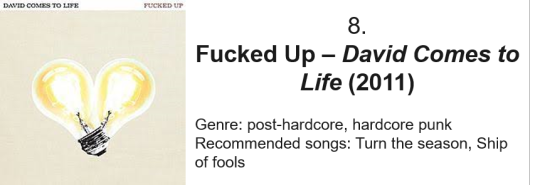
Inspired by classic rock operas, this concept album represents some major ambition and innovation in musical storytelling. Delivered in frontman Damian Abraham’s gravelly shouted vocals, the complex lyrical narrative of the album follows a factory worker, an activist and their struggle against the omnipotent author (Abraham himself) who controls their fates. Featuring devices like unreliable narrators and fourth-wall breaking, it takes some serious reading into to untangle. But it’s the bright guitarwork, combining upbeat punk rock and indie to create some killer riffs, that gives the album its furious energy and cinematic proportions.
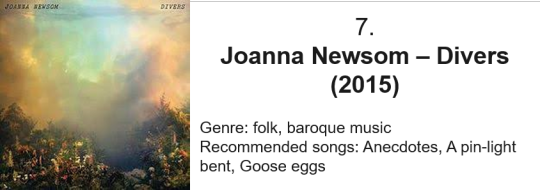
Joanna Newsom is enchanted by the past. Like 2006’s ambitious Ys, the music on Divers makes this evident with its invocation of Western classical and medieval music, throwing antiquated instruments like clavichords together with lush string orchestration, woodwinds, organs, folk guitar and Newsom’s signature harp. With her soulful, moving vocals leading the way, it’s hard not to imagine her as some kind of Renaissance-era country woman contemplating nature, love and mortality in the fields and the woods. As always Newsom proves herself a stunningly original and creative arranger with the sheer compositional intricacy and flow of these songs, and most of all the harmonious intertwining of singing and instrumental backing.

Burial’s music is born from the London night: the bustle of the streets, the faint sounds from distant raves, the buskers, the rain on bus windows. This EP’s dreamlike quality makes listening to it feel like taking a trip across the city well after midnight, watching the lights go by, with no idea where you hope to get to. Every single sound and effect on these two songs is so precisely chosen, from the shifting and shuffling beats, the swelling synths and wordless vocals that sound like a club from a different dimension, the ambient hiss and pop of a vinyl record. Musically this sound is drawn from UK-based scenes like 2-step and drum ‘n bass, but twisted into such a moody and abstracted form as to be nearly unrecognisable as dubstep. Just when this urban, dismal sound is at its most oppressive, heavenly soul singers or organs cut through like a ray of light in the dark.
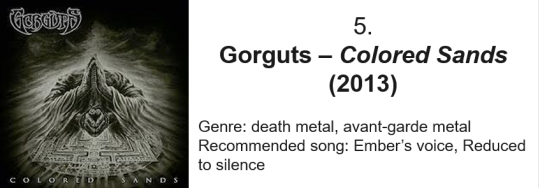
There’s an imaginary rulebook of how construct music, how to properly make tempos and combinations of notes sound harmonious, and Gorguts have spent their career ripping it up and throwing it in the bin. On 1998’s seminal Obscura, their atonal experimentation sounded at times like random noises in random order. But listen closely to Obscura or Colored Sands, their return after a long hiatus, and the method behind the madness emerges. One mark of great death metal is that it’s impossible to predict what direction it will go even a few seconds in advance, and the band achieves this while presenting a heavy, slow, momentous sound. The density of inspired riffs, and the intricate balancing of loud and quiet, fast and slow paced throughout these songs are exceptional. In instrumental sections the guitars will echo out as if across a barren plane, then the song will build up to the momentum of a freight train. Behind the crashing and twisting walls of guitar the patterns of blast beat drumming are almost mathematical in nature. Luc Lemay’s harsh bellows sound like a warlord’s cry or a pure expression of rage to the void. It’s threatening, menacing, unapproachable, but it all makes sense in the end.
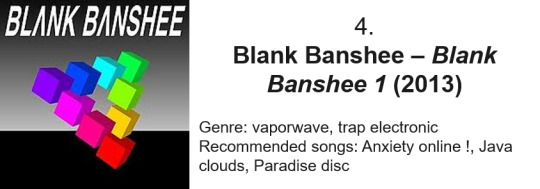
Futuristic yet deeply retro, Blank Banshee’s music takes vaporwave beyond its roots in the pure consumerist parody of artists like Vektroid and James Ferraro and makes it actually sound amazing. Songs are built out of a single vocal snippet processed beyond recognition, new agey synthesisers, Windows XP-era computer noises, hilariously out of place instruments, all set to the 808 bass and hi-hats of hip-hop style beats. The genre’s pioneers intentionally sucked the soul from their music using samples pulled from 70s and 80s elevators, infomercials and corporate lounges - here the throwback seems to be to the early 2000s childhood of the internet, and the influence of a time when email and forums were revolutionary can be felt. The effect of this insanity is an album that whirls by like a techno-psychedelic haze: the atmosphere of dark trap beats places you squarely in a 2013 studio one moment, the next you’re surrounded by relaxing midi pianos and humming that a temple of new age practitioners would meditate to. Still, at some point when listening to this album, perhaps when the ridiculous steel drums kick in near the end, you realise that this is all to some degree a joke, and a funny one. It’s hard to overstate what an entertaining half-hour this thing is.

While 2012’s Good Kid, m.a.a.d City presented a movie in album form of Kendrick’s childhood and early adult years, TPAB’s journey is one of personal growth, introspection, and nuanced examination of the state of race in post-Ferguson America. It’s simultaneously the Zeitgeist for the US in 2015 and a soul-search in the therapist’s office. Sounding deeply vulnerable, he openly discusses depression, alcoholism, religion and feelings of helplessness. The White House and associated gangstas on the cover give some idea to the album’s political themes, with Lamar contrasting Obama’s presidency to the political powerlessness and lifelong ghetto entrapment of millions of black Americans. Everything I’ve written about the lyrics here really only scratches the surface because the words here are substantive, complex and dense with meaning. Near enough every bar can be analysed for multiple meanings and interpretations, essays can and have been written on the overall work, anything less does not do justice. The musical versatility on display is astounding: the album acts as an extravaganza of African-American music, from smooth west coast G-funk to east coast grit, neo-soul and rock to beat poetry, and most of all jazz. Like an expertly laid character arc the record progresses through its ideas in such a way that they’re all impactful, with the slurred rapping imitating a depressed drunken stupor followed later by exuberant, defiant cries of “I love myself!”, the white-hot rage against police brutality balanced by the hopeful mantra: “do you hear me, do you feel me, we gon be alright”. Perhaps the most culturally significant album of the 2010s and an essential piece of the hip-hop canon.
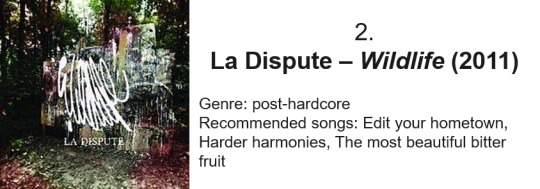
This harrowing hour chronicles the struggles and everyday tragedy of a series of characters and their relationship with the city they live in, narratively driven by some outstandingly poetic lyrics. Jordan Dreyer’s wordy tales despair at the poverty, gang violence and urban decay in the band’s native Grand Rapids, Michigan, an almost childlike open-hearted naivete in his words as he empathises with the broken and alienated people in these songs. There’s no jaded sneer or sly lesson to be learned as he sings about the child killed by a stray bullet or the homebird left alone after all their friends move away, just genuine second-hand sadness and a dream that compassion and community will eventually heal the pain. Taking elements from bands like At the Drive-In’s fusion of punk and progressive, and mewithoutyou’s shout-sung vocals, La Dispute hones its sound to a razor edge to put fierce instrumental power behind the lyrics. Not an easy listen, but a sharply written songbook and a perfect execution on its concept.
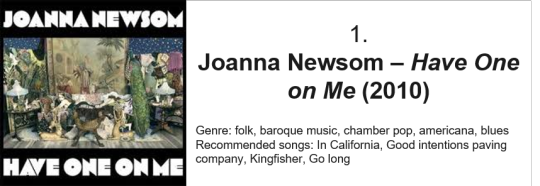
Around 2008, Joanna Newsom met comedian Andy Samberg. Within a year, their relationship was becoming the basis upon which the poetry of Have One on Me was spun. Newsom’s lyrics, exploring her relationship with her future-husband, nature, death, spirituality, are above all else loving. Through her warm and vibrant voice, at times an operatic trill and in others deeply soulful, she expresses the joy of love for another, the peace and earthly connection of her beloved pastoral lifestyle, deeply affecting melancholy and grief. Contemplative, artful, genuine or expressive: every lyric in every sweet melody is used to offer her ruminations on life or overflowings of passion.
More so than her previous and next albums, the feel of the album is of not just a folkloric past but also the present day, with drums, substantial brass and string arrangements, and even electric guitar anchoring the sound to Newsom’s real, not imaginary, life in the 21st century. Yet songs here with moods or settings evoking simpler lifestyles and the women living them in 1800s California or the Brontës’ English moors still have a universal relevance. Whether rooted in past of present, the instrumental variety of these compositions, from classical solo piano, grand orchestral arrangements led by harp, to the twang of country guitars or intricate vocal harmonising, makes it apparent that this is the work of a master songwriter in full command of well over a dozen talented musicians. Ultimately, what makes this my favourite album of the decade is that, very simply, it is one stunningly beautiful song after another, all collated into a cohesive 2-hour portrait of Newsom’s soul.
4 notes
·
View notes
Note
Can I have a bmc and deh ship please? I'm 5"5 Pan girl with blonde and brown hair and green eyes. I'm normally wearing either a dress or a T-shirt and skirt, but always wear a black leather jacket. I love writing, acting, singing, playing the trumpet, and cosplay. I also listen to music a lot, normally musicals or Panic! and mcr. I'm very shy, but if you mention something I like or a meme, I get talking.
You sure can!
BMC:
I ship you with Michael!
He's also one of those shy yet outgoing people so it would probably take a third party to introduce you. Maybe Jeremy gets tired of him staring at you longingly and pulls him over to you. "This is my friend, Michael. He's practically already named your children so you might as well talk."
You'd probably bond over music tastes. He's always got his headphones on hand so he can share his latest obsession. He likes a little bit of everything so he'd be into your music. You guys would be spotted more than once walking along, sharing earbuds. Awe cute!
You guys buy each other patches and pins to put on your respective jackets. He's all blushy when he gives you a little Pac-Man pin when you first start dating and that starts the tradition
Speaking of jackets, he LOVES yours. He always wants to try it on so you give him a choice: he can wear yours if he lets you wear his hoodie. He has to think about it long and hard, but he trusts you so you get to make the swap
He would 100% be up for cosplaying with you. He'd ease into it, starting off by dressing up as his favorite video game characters and eventually wanting to do couples costumes. He would immediately start saving up for Comic-Con
He loves that you play the trumpet and wants to re-create different vines and memes with it, the nerd
He's so amazed that you have so many interests/talents. He probably gets high one night and just texts you these paragraph-long messages, going on and on about how wonderful you are and how did he get so lucky? and why is this literal perfection in human form giving him the time of day?
He'll come to any and all performances you do. He sits front row and is absolutely obnoxious, clapping and cheering so loud. "That's my girl! That beautiful angel right there is my girlfriend!" It's embarrassing but you expect nothing less from that dork
DEH:
I ship you with Zoe!
She loves your style so much that she goes out and gets her own leather jacket. She says you guys look like you're in a badass girl gang and its awesome
And she's constantly stealing your clothes to the point that she rarely wears her own anymore. She just really likes your style ok?
The only constant in her wardrobe is her beat up Converse, which she's always doodling on with a sharpie. One day you notice that she wrote your name on the right one with a bunch of hearts
You probably met in band. One of you passed by one of the practice rooms, heard the music, and waited for the other to come out so you could talk
You help her write songs sometimes and have little jam sessions where you sing whatever comes to mind (this annoys the hell out of Connor in the next room but he'll get over it)
She would learn the acoustic cover of your favorite songs and play them for you when you're sad or stressed. It's the sweetest thing
She's not much of a cosplayer but she'll be your personal entourage, taking a bunch of photos and posting on social media: 'Don't tell my girlfriend, but I'm thinking of leaving her for this cutie ❤'
She'll run lines with you if you need to but you rarely ask her because she never takes it seriously, always cracking up and making jokes. You wanna be mad but her scrunched up nose and adorable laugh make it hard
Thanks! 😙
5 notes
·
View notes
Link
On this matter, I had decided to keep my thoughts to myself. I had a special relationship with the man standing trial. If I had been a judge and he had been brought to my court, I would have recused myself. But I was a journalist, who was expected to report the news irrespective of who was involved.
Great men and women, they say, are like eagles. They don’t flock. They are spotted one at a time. Once in a while. It is even rarer to witness their trial. Only a few centenarians see such events once in their lifetime. I witnessed one in my youthful days and wish to tell this rare tale in detail.
The year was two thousand and eighteen. The court was a state called Ghana. The potential jury was about 30 million men, women and children. And one hapless man was helpless in the merciless court of public opinion.
Criticisms, like volleys of gunfire from a formidable army determined to crush an unyielding enemy, were fired from all directions. What came was more than just criticism. Tongues hotter than pepper, sharper than circumcision razors and more poisonous than the deadly venom of a viper came cutting like a sharp knife in boneless meat. The target was treated like a congenital and unrepentant criminal. Some Jews might have been kinder to Hitler than some Ghanaians were to this man.
Those who showed some form of solidarity with him were described as brainless idiots. There was not a better time to attack Christians. Those who maintained silence were not spared either. You were either with him or against him. There was no midway. This was where I came in.
READ ALSO: Ecobank Ghana meets GHS400 MCR
On this matter, I had decided to keep my thoughts to myself. I had a special relationship with the man standing trial. If I had been a judge and he had been brought to my court, I would have recused myself. But I was a journalist, who was expected to report the news irrespective of who was involved. I was part of the news team that covered the stories of this man and the reason for his attack. So I could say my duty was fulfilled. But people wanted more than the news. They wanted my opinion. Was I that important? And did my opinion matter that much?
Not really! At the time, I was a young man of exactly the same age Jesus Christ attained when he finished his mission on earth. In a country where success was synonymous with wealth, there was not much to my name except my journalistic fame, thanks to my stubborn refusal to tame my tongue in the affairs of my lame country.
As a journalist, I considered my role as that of the “gadfly” described by Socrates in his famous defence, The Apology, when he stood accused by the Athenian state of corrupting minds with his teachings. Socrates said he was “a sort of gadfly, given to the state by the God; and the state is like a great and noble steed who is tardy in his motions owing to his very size, and requires to be stirred into life.”
Buoyed by the disproportionate curse and blessing of youthful exuberance, I acted like the innocent child in Hans Christian Anderson’s classic The Emperor’s New Clothes. I said it as I saw it, with very little or no regard for political correctness.
READ ALSO: 400 BEIGE bank staff sacked as restructure of Consolidated bank begins
But I did not speak on every issue, even when I was very qualified to do so. Early that year, someone had called me a “hypocrite” for failing to comment on Kennedy Agyepong’s video about my colleague investigative journalist, Anas Aremeyaw Anas. He claimed my colleague was exposed and if he had been someone else, I would have made “noise”. When the issue of investigative journalism ethics came up concerning Anas’ work, I was one of the most qualified persons in the country to share an opinion on the subject. Considering the atmosphere in Ghana at the time, however, it was wise to keep my thoughts to myself.
The reason for the pressure on me to speak on the banking saga that rocked Ghana that year was because the condemnation had whittled down to one great man. He was a pastor, who had built a citadel of order and sanity (a church) in an empire of chaos and filth, literally and figuratively.
He was one of the greatest preachers the nation had seen and would ever see, one of the very few Church leaders who had a huge following without miracles at the centre of their magnetic fields. His church, the International Central Gospel Church (ICGC), had employed over 1000 pastoral and administrative staff in Ghana alone. The Central University had employed about 397 people. Central Aid, the largest non-governmental scholarship scheme in Ghana had awarded scholarships to nearly 4,500 Ghanaians irrespective of their religious and ethnic persuasion since 1988. He had saved many lives through his church’s direct financial support to hospitals in Ghana.
ICGC was the biggest institutional donor to the Korle-Bu Teaching Hospital’s Children Cancer Unit. For eight years, the church had continuously supported the unit with funds every month. Christ Temple also sponsored 14 charities monthly to undertake activities ranging from free surgeries to Bible translation to helping the physically challenged. The list appears endless.
In fact, it was easier to swim across the Atlantic Ocean with a 50kg bag of cement tied around your neck than to find ten people who had, through individual initiatives, impacted and influenced the nation more positively than him. His name was Pastor Mensa Otabil. He presented himself as a sign post to Christ, and did not project himself as the Christ.
READ ALSO: Uber drivers threaten to strike again
“If you have my photograph on your wall, then I guess I’m handsome enough to be on your wall,” he told his congregation. “But if you need help in the night, call Jesus, not me, because even if you have my number, I might be sleeping and would not hear you.”
Pastor Mensa Otabil had disdain for mediocrity. And he had the guts to question the status quo, which was an unwritten offence in Ghana ranked higher than high treason. For being who he was, he was loved and hated. Revered and resented. In almost equal measure.
This was the man who was in the centre of the storm. His offence?
Seven banks in the land had collapsed under disturbing circumstances. Those who had enough expertise in the sector said the banks were mismanaged. Some of them had borrowed money from the Central Bank to revive their operations. Those monies, according to a leaked report (which was being challenged), were misused. Part of that money was used for other investments, other than the core functions of the banks. Dr. Mensa Otabil was the board chairman of one of the failed banks.
The reason I was being hounded to speak was not because I had any expertise in the banking sector. It was because my callers knew Pastor Mensa Otabil was my role model and mentor in many ways. That was not a secret. I adored him. What was not widely known was the fact that he was also a father to me. He was one of the people who encouraged me, especially when I came under the wrath of the nation, when the attacks rained on me like fire and brimstone.
READ ALSO: Sinohydro clears path at Atewa Forest bauxite mining
To be clear, I was not attacked because I had stolen from somebody’s barn. Neither was I attacked because I had mounted another man’s wife. In Ghana, in those days, different reasons motivated attacks. It was more about the person involved than the issue at stake. If they “meant” someone, they would pray that their prey should stray. In Twi they say, “Y’abɔ wo ato hɔ.”
On one occasion I was widely attacked because I questioned why an Africa CEOs forum was being held in Europe, and not in Africa. On another, I was attacked because I exposed the misdeeds of a business empire that was built on dubious and corrupt contracts from the state. For instance, I provided proof of how a contract that was supposed to cost less than one million cedis was awarded at a cost of over 62 million cedis. My attackers, led by the Ghana Journalists Association, accused me of attempting to destroy Ghanaian businesses.
Now, back to my tale: On the issue of the collapsed banks, Ghanaians had reason to be upset. The money used for the bailout was their money, the taxpayers’ money. Depositors’ funds had been jeopardised. Besides, some of the people who had lost their jobs as a result of the failed banks found it difficult to keep their bodies and souls together. So I didn’t fault people who were angry. It was their right to express their minds. I did not defend those who supervised the collapse.
On the criticism of the players, it was understandable that Pastor Mensa Otabil would arouse more interest because of what he stood for – excellence. He himself was critical of society and its shortcomings so people were bound to criticise him more than the other “ordinary” persons involved. That was expected.
But it appeared there was something more sinister in the trial of Pastor Mensa Otabil than his role in the banking saga. The spontaneous gloating and sadism, which greeted social media when his name popped up, raised questions I needed answers to before I could respond to their call to join condemning him.
I wanted to know why every arsenal employed came down to one man. There were seven banks, so if Dr. Mensa Otabil was Chairman of one board, why were all the rest of board chairpersons left out? Why did people not care to even know their names? Their roles? Granted each board had five board members, it was safe to say there were 35 other board of directors. Why was everyone left out completely?
READ ALSO: BOST Board Chair steps down over Sovereign Bank collapse
If the answer is that Pastor Otabil should have known better and given better advice based on who he was, why was Dr. Kwabena Duffuor, owner of one of the collapsed banks, left out of the attacks? He was not “ordinary” here. When I was too young to impregnate a woman, Dr. Duffuor was the Governor of the Bank of Ghana. And when I was old enough to own one, he was Ghana’s finance minister. [Dear feminist, please, my wife is mine and I’m hers. So shelve your monocle!]
If there was one person who should have been held to the highest of standards in the banking crises, it was Dr. Duffuor.
No?
I also wanted to know if the nation was really outraged about the misuse of public funds. One ill-informed bloke who called me out was highly applauded when he saidI would have made noise if the GHS610 million loan to Capital Bank had been given to Zoomlion. Had I not shown the nation how a single fraudulent contract given to Zoomlion to manage the sweepers in Ghana had cost the state more than GHS2.2 BILLION CEDIS? Nobody stirred over this revelation. Nobody lost sleep! They accused me of hating the owner of the company when I persisted.
And if they were outraged about the plight of the 800 Capital Bank workers, why were they not outraged by the fact that the above contract gave Zoomlion GHS500 per worker per month and allowed the company to keep GHS400 and pay the poor worker GHS100 cedis or $22 a month? Was this not slavery? Or were Zoomlion’s victims, numbering about 45,000, donkeys?
In 2017, why did a section of society (especially journalists, led by the Ghana Journalists Association) attack me for exposing wasteful and fraudulent contracts worth more than ONE BILLION cedis awarded to the Jospong Group? Was that not the taxpayers’ money?
So it appeared the calls on me to comment were calls to do one thing: attack Dr. Mensa Otabil. Like Julius Caesar, they came to bury Otabil, not to praise him. They needed me to prove that I was bold. But I told them it was good to be bold and fearless, but sometimes it was better to be a coward. I would not publicly attack a father who would have reached out to solidarize with me if I were in the centre of the storm.
Besides, I had no point to prove to anyone. My convictions did not thrive on the validation of the crowd. I was not going to be part of the jubilant pallbearers of Mensa Otabil. I respected their right to condemn him, and they should also respect my right not to offer an opinion after reporting the news.
The call on me to condemn Pastor Otabil was also unjustified. Unlike the stories I had personally investigated, the banking reports carried by the media were solely based on portions of a leaked report. No one had owned up to it. I, like the other journalists, could not independently verify or stand by the claims in there. Rushing to judgment came with consequences I was too familiar with. People did not take my comments, even those on social media, lightly. The RLG CEO and the Zoomlion CEO had, on separate occasions, sued me for defamation based on my Facebook comments. I was happy to meet them in court because I was armed with published and unpublished facts to defend myself.
State institutions were investigating the matter and had promised to deal ruthlessly with whoever was found culpable. If Dr. Mensa Otabil was found culpable and was to be shot or hanged, as some people had suggested, I would still learn lessons from his successes and failures as a fallible mortal being who dared to dream.
Before he was found guilty and sentenced to death, Socrates said: “I dare say, Athenians, that someone among you will reply, ‘Why is this, Socrates, and what is the origin of these accusations of you: for there must have been something strange which you have been doing? All this great fame and talk about you would never have arisen if you had been like other men.’”
From Otabil’s trial, I would learn that if I distinguished myself from other men and women, I would be judged harshly should I fall short of the standard. Knowing my society, I would learn that I would be judged maliciously. But the fear of harsh and malicious judgment should not stop one from aspiring to the highest virtues such as excellence and integrity. One must not fear death and refuse to sleep.
Great people who have shaped the world were not without blemish. They did not have clean sheets of success. They recorded failures. They had their ups and downs. They had their weaknesses. And their sins. Shakespeare said, “The evil that men do lives after them. The good is oft interred with their bones.”
I shudder to say he was wrong. The balance sheet of posterity has a way of offsetting our good deeds against our bad deeds and presenting to generations that come after us the dominant character of our lives.
Nelson Mandela had failed marriages, but he is not remembered for that. Dr. Martin Luther King Jnr confessed to his wife of his infidelity a month before he was killed, but his iconic status in the world outshines some saints. Mahatma Gandhi’s statue still stands defiantly in the university of Ghana despite protests against its erection. Those against it said Gandhi was a racist, but his service to humanity outbalanced the accusation of racism against him. The day after Kwame Nkrumah’s overthrow, the Daily Graphic carried a story attributed to a Ga chief in Accra. The headline was: “The Fall of Nkrumah More Spectacular Than the Fall of Satan.” Nkrumah is the most vilified Ghanaian head of state but he is our most popular President ever, and remains one of Africa’s greatest men of all time.
As we trudge wearily across the slippery stage of life, trying to distinguish ourselves from the crowd, we are watched keenly by a sea of spectators who are ready to celebrate our fall. May we not abandon our call even when we fall. We must give life our all. And fight on until history remembers us in its glorious curtain call.
via Nigerian News ➨☆LATEST NIGERIAN NEWS ☆➨GHANA NEWS➨☆ENTERTAINMENT ☆➨Hot Posts ➨☆World News ▷NEWS
#IFTTT#Nigerian News ➨☆LATEST NIGERIAN NEWS ☆➨GHANA NEWS➨☆ENTERTAINMENT ☆➨Hot Posts ➨☆World News ▷NE
0 notes
Text
Manasseh Writes: The trial of Mensa Otabil
On this matter, I had decided to keep my thoughts to myself. I had a special relationship with the man standing trial. If I had been a judge and he had been brought to my court, I would have recused myself. But I was a journalist, who was expected to report the news irrespective of who was involved.
Great men and women, they say, are like eagles. They don’t flock. They are spotted one at a time. Once in a while. It is even rarer to witness their trial. Only a few centenarians see such events once in their lifetime. I witnessed one in my youthful days and wish to tell this rare tale in detail.
The year was two thousand and eighteen. The court was a state called Ghana. The potential jury was about 30 million men, women and children. And one hapless man was helpless in the merciless court of public opinion.
Criticisms, like volleys of gunfire from a formidable army determined to crush an unyielding enemy, were fired from all directions. What came was more than just criticism. Tongues hotter than pepper, sharper than circumcision razors and more poisonous than the deadly venom of a viper came cutting like a sharp knife in boneless meat. The target was treated like a congenital and unrepentant criminal. Some Jews might have been kinder to Hitler than some Ghanaians were to this man.
Those who showed some form of solidarity with him were described as brainless idiots. There was not a better time to attack Christians. Those who maintained silence were not spared either. You were either with him or against him. There was no midway. This was where I came in.
READ ALSO: Ecobank Ghana meets GHS400 MCR
On this matter, I had decided to keep my thoughts to myself. I had a special relationship with the man standing trial. If I had been a judge and he had been brought to my court, I would have recused myself. But I was a journalist, who was expected to report the news irrespective of who was involved. I was part of the news team that covered the stories of this man and the reason for his attack. So I could say my duty was fulfilled. But people wanted more than the news. They wanted my opinion. Was I that important? And did my opinion matter that much?
Not really! At the time, I was a young man of exactly the same age Jesus Christ attained when he finished his mission on earth. In a country where success was synonymous with wealth, there was not much to my name except my journalistic fame, thanks to my stubborn refusal to tame my tongue in the affairs of my lame country.
As a journalist, I considered my role as that of the “gadfly” described by Socrates in his famous defence, The Apology, when he stood accused by the Athenian state of corrupting minds with his teachings. Socrates said he was “a sort of gadfly, given to the state by the God; and the state is like a great and noble steed who is tardy in his motions owing to his very size, and requires to be stirred into life.”
Buoyed by the disproportionate curse and blessing of youthful exuberance, I acted like the innocent child in Hans Christian Anderson’s classic The Emperor’s New Clothes. I said it as I saw it, with very little or no regard for political correctness.
READ ALSO: 400 BEIGE bank staff sacked as restructure of Consolidated bank begins
But I did not speak on every issue, even when I was very qualified to do so. Early that year, someone had called me a “hypocrite” for failing to comment on Kennedy Agyepong’s video about my colleague investigative journalist, Anas Aremeyaw Anas. He claimed my colleague was exposed and if he had been someone else, I would have made “noise”. When the issue of investigative journalism ethics came up concerning Anas’ work, I was one of the most qualified persons in the country to share an opinion on the subject. Considering the atmosphere in Ghana at the time, however, it was wise to keep my thoughts to myself.
The reason for the pressure on me to speak on the banking saga that rocked Ghana that year was because the condemnation had whittled down to one great man. He was a pastor, who had built a citadel of order and sanity (a church) in an empire of chaos and filth, literally and figuratively.
He was one of the greatest preachers the nation had seen and would ever see, one of the very few Church leaders who had a huge following without miracles at the centre of their magnetic fields. His church, the International Central Gospel Church (ICGC), had employed over 1000 pastoral and administrative staff in Ghana alone. The Central University had employed about 397 people. Central Aid, the largest non-governmental scholarship scheme in Ghana had awarded scholarships to nearly 4,500 Ghanaians irrespective of their religious and ethnic persuasion since 1988. He had saved many lives through his church’s direct financial support to hospitals in Ghana.
ICGC was the biggest institutional donor to the Korle-Bu Teaching Hospital’s Children Cancer Unit. For eight years, the church had continuously supported the unit with funds every month. Christ Temple also sponsored 14 charities monthly to undertake activities ranging from free surgeries to Bible translation to helping the physically challenged. The list appears endless.
In fact, it was easier to swim across the Atlantic Ocean with a 50kg bag of cement tied around your neck than to find ten people who had, through individual initiatives, impacted and influenced the nation more positively than him. His name was Pastor Mensa Otabil. He presented himself as a sign post to Christ, and did not project himself as the Christ.
READ ALSO: Uber drivers threaten to strike again
“If you have my photograph on your wall, then I guess I’m handsome enough to be on your wall,” he told his congregation. “But if you need help in the night, call Jesus, not me, because even if you have my number, I might be sleeping and would not hear you.”
Pastor Mensa Otabil had disdain for mediocrity. And he had the guts to question the status quo, which was an unwritten offence in Ghana ranked higher than high treason. For being who he was, he was loved and hated. Revered and resented. In almost equal measure.
This was the man who was in the centre of the storm. His offence?
Seven banks in the land had collapsed under disturbing circumstances. Those who had enough expertise in the sector said the banks were mismanaged. Some of them had borrowed money from the Central Bank to revive their operations. Those monies, according to a leaked report (which was being challenged), were misused. Part of that money was used for other investments, other than the core functions of the banks. Dr. Mensa Otabil was the board chairman of one of the failed banks.
The reason I was being hounded to speak was not because I had any expertise in the banking sector. It was because my callers knew Pastor Mensa Otabil was my role model and mentor in many ways. That was not a secret. I adored him. What was not widely known was the fact that he was also a father to me. He was one of the people who encouraged me, especially when I came under the wrath of the nation, when the attacks rained on me like fire and brimstone.
READ ALSO: Sinohydro clears path at Atewa Forest bauxite mining
To be clear, I was not attacked because I had stolen from somebody’s barn. Neither was I attacked because I had mounted another man’s wife. In Ghana, in those days, different reasons motivated attacks. It was more about the person involved than the issue at stake. If they “meant” someone, they would pray that their prey should stray. In Twi they say, “Y’abɔ wo ato hɔ.”
On one occasion I was widely attacked because I questioned why an Africa CEOs forum was being held in Europe, and not in Africa. On another, I was attacked because I exposed the misdeeds of a business empire that was built on dubious and corrupt contracts from the state. For instance, I provided proof of how a contract that was supposed to cost less than one million cedis was awarded at a cost of over 62 million cedis. My attackers, led by the Ghana Journalists Association, accused me of attempting to destroy Ghanaian businesses.
Now, back to my tale: On the issue of the collapsed banks, Ghanaians had reason to be upset. The money used for the bailout was their money, the taxpayers’ money. Depositors’ funds had been jeopardised. Besides, some of the people who had lost their jobs as a result of the failed banks found it difficult to keep their bodies and souls together. So I didn’t fault people who were angry. It was their right to express their minds. I did not defend those who supervised the collapse.
On the criticism of the players, it was understandable that Pastor Mensa Otabil would arouse more interest because of what he stood for – excellence. He himself was critical of society and its shortcomings so people were bound to criticise him more than the other “ordinary” persons involved. That was expected.
But it appeared there was something more sinister in the trial of Pastor Mensa Otabil than his role in the banking saga. The spontaneous gloating and sadism, which greeted social media when his name popped up, raised questions I needed answers to before I could respond to their call to join condemning him.
I wanted to know why every arsenal employed came down to one man. There were seven banks, so if Dr. Mensa Otabil was Chairman of one board, why were all the rest of board chairpersons left out? Why did people not care to even know their names? Their roles? Granted each board had five board members, it was safe to say there were 35 other board of directors. Why was everyone left out completely?
READ ALSO: BOST Board Chair steps down over Sovereign Bank collapse
If the answer is that Pastor Otabil should have known better and given better advice based on who he was, why was Dr. Kwabena Duffuor, owner of one of the collapsed banks, left out of the attacks? He was not “ordinary” here. When I was too young to impregnate a woman, Dr. Duffuor was the Governor of the Bank of Ghana. And when I was old enough to own one, he was Ghana’s finance minister. [Dear feminist, please, my wife is mine and I’m hers. So shelve your monocle!]
If there was one person who should have been held to the highest of standards in the banking crises, it was Dr. Duffuor.
No?
I also wanted to know if the nation was really outraged about the misuse of public funds. One ill-informed bloke who called me out was highly applauded when he saidI would have made noise if the GHS610 million loan to Capital Bank had been given to Zoomlion. Had I not shown the nation how a single fraudulent contract given to Zoomlion to manage the sweepers in Ghana had cost the state more than GHS2.2 BILLION CEDIS? Nobody stirred over this revelation. Nobody lost sleep! They accused me of hating the owner of the company when I persisted.
And if they were outraged about the plight of the 800 Capital Bank workers, why were they not outraged by the fact that the above contract gave Zoomlion GHS500 per worker per month and allowed the company to keep GHS400 and pay the poor worker GHS100 cedis or $22 a month? Was this not slavery? Or were Zoomlion’s victims, numbering about 45,000, donkeys?
In 2017, why did a section of society (especially journalists, led by the Ghana Journalists Association) attack me for exposing wasteful and fraudulent contracts worth more than ONE BILLION cedis awarded to the Jospong Group? Was that not the taxpayers’ money?
So it appeared the calls on me to comment were calls to do one thing: attack Dr. Mensa Otabil. Like Julius Caesar, they came to bury Otabil, not to praise him. They needed me to prove that I was bold. But I told them it was good to be bold and fearless, but sometimes it was better to be a coward. I would not publicly attack a father who would have reached out to solidarize with me if I were in the centre of the storm.
Besides, I had no point to prove to anyone. My convictions did not thrive on the validation of the crowd. I was not going to be part of the jubilant pallbearers of Mensa Otabil. I respected their right to condemn him, and they should also respect my right not to offer an opinion after reporting the news.
The call on me to condemn Pastor Otabil was also unjustified. Unlike the stories I had personally investigated, the banking reports carried by the media were solely based on portions of a leaked report. No one had owned up to it. I, like the other journalists, could not independently verify or stand by the claims in there. Rushing to judgment came with consequences I was too familiar with. People did not take my comments, even those on social media, lightly. The RLG CEO and the Zoomlion CEO had, on separate occasions, sued me for defamation based on my Facebook comments. I was happy to meet them in court because I was armed with published and unpublished facts to defend myself.
State institutions were investigating the matter and had promised to deal ruthlessly with whoever was found culpable. If Dr. Mensa Otabil was found culpable and was to be shot or hanged, as some people had suggested, I would still learn lessons from his successes and failures as a fallible mortal being who dared to dream.
Before he was found guilty and sentenced to death, Socrates said: “I dare say, Athenians, that someone among you will reply, ‘Why is this, Socrates, and what is the origin of these accusations of you: for there must have been something strange which you have been doing? All this great fame and talk about you would never have arisen if you had been like other men.’”
From Otabil’s trial, I would learn that if I distinguished myself from other men and women, I would be judged harshly should I fall short of the standard. Knowing my society, I would learn that I would be judged maliciously. But the fear of harsh and malicious judgment should not stop one from aspiring to the highest virtues such as excellence and integrity. One must not fear death and refuse to sleep.
Great people who have shaped the world were not without blemish. They did not have clean sheets of success. They recorded failures. They had their ups and downs. They had their weaknesses. And their sins. Shakespeare said, “The evil that men do lives after them. The good is oft interred with their bones.”
I shudder to say he was wrong. The balance sheet of posterity has a way of offsetting our good deeds against our bad deeds and presenting to generations that come after us the dominant character of our lives.
Nelson Mandela had failed marriages, but he is not remembered for that. Dr. Martin Luther King Jnr confessed to his wife of his infidelity a month before he was killed, but his iconic status in the world outshines some saints. Mahatma Gandhi’s statue still stands defiantly in the university of Ghana despite protests against its erection. Those against it said Gandhi was a racist, but his service to humanity outbalanced the accusation of racism against him. The day after Kwame Nkrumah’s overthrow, the Daily Graphic carried a story attributed to a Ga chief in Accra. The headline was: “The Fall of Nkrumah More Spectacular Than the Fall of Satan.” Nkrumah is the most vilified Ghanaian head of state but he is our most popular President ever, and remains one of Africa’s greatest men of all time.
As we trudge wearily across the slippery stage of life, trying to distinguish ourselves from the crowd, we are watched keenly by a sea of spectators who are ready to celebrate our fall. May we not abandon our call even when we fall. We must give life our all. And fight on until history remembers us in its glorious curtain call.
source http://www.newssplashy.com/2018/08/manasseh-writes-trial-of-mensa-otabil.html
0 notes